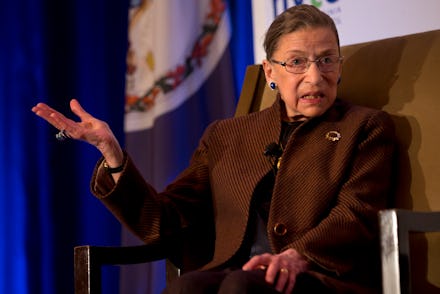In One Quote, Ruth Bader Ginsburg Sums Up Everything Wrong With Our Modern Politics

Ruth Bader Ginsburg has been one of the Supreme Court's most outspoken liberal justices for more than two decades, so when she tells you something is important, you should listen. Lately, she's been sounding the alarms on the unrestricted flow of big money into American politics.
In a new interview with the New Republic's Jeffrey Rosen, Ginsburg made it pretty clear which recent Supreme Court decision she thinks has been the most disastrous for the country (emphasis ours):
"If there was one decision I would overrule, it would be Citizens United. I think the notion that we have all the democracy that money can buy strays so far from what our democracy is supposed to be. So that's No. 1 on my list."
She's referring to Citizens United v. FEC, the controversial 2010 Supreme Court ruling that held that the First Amendment prohibited the federal government from imposing limits on independent political expenditures by nonprofit organizations. When the court sided with the plaintiffs, Ginsburg joined a lengthy dissent authored by Justice John Paul Stevens that argued the case "threatens to undermine the integrity of elected institutions across the Nation."
The three cases collectively enshrined an expansive view of the power of money as free speech, an interpretation of the First Amendment that puts the nation's entire campaign finance framework in jeopardy and has become conservative dogma in recent years.
Ginsburg fights back: Since the Citizens United decision, Ginsburg has been taking an increasingly active role criticizing the modern state of campaign finance. In 2012, she wrote that Montana's experience with corruption made "it exceedingly difficult to maintain that independent expenditures by corporations 'do not give rise to corruption or the appearance of corruption.'"
"You take the limits off and say, 'You can spend as much as you want,' and people will spend and spend," Ginsburg told Bloomberg News in 2013. "People are appalled abroad. It's a question I get asked all the time: Why should elections be determined by how much a candidate can spend and why should candidates spend most of their time these days raising the funds so that they will prevail in the next election?"
In 2014 she noted in an interview with Katie Couric that many opinions from dissenting judges were "now unquestionably the law of the land," saying that she felt Citizens United should and will be overturned.
Standing up to "dark money": As Ginsburg ups the pressure in public, other groups are detailing how "dark money" — funds that aren't disclosed to voters before an election — manages shape the electoral system, since super PACs don't need to disclose their donors.
And here's how much of that money is actually being disclosed:
In 2012, undisclosed donors injected about $311 million into American elections, almost one-third of the Obama campaign's $1.1 billion budget.
If you think that this is what democracy should look like, then Ginsburg probably isn't going to change your mind. But the rest of us would do well to realize that this is not conducive to a functional democracy. Ginsburg is right: If we don't do something to reverse this trend soon, our elections will be won by the highest bidder.